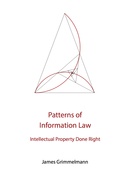Explore

Patterns of Information Law: Intellectual Property Done Right
James Grimmelmann
2016
Patterns of Information Law is the coursepack assembled for a fall 2016 intellectual property survey at Cornell Tech. (It draws heavily on materials used in prior semesters at the University of Maryland and at New York Law School.)
Please see the Introduction for a detailed explanation of what this book is about. In brief, here are the authors' commitments:
- Intellectual property consists of private rights to prevent other people from using information.
- The author has tried to include a much wider range of IP fields and related areas than is typical, with coverage including undeveloped ideas, trade secrets, privacy law, government classification, FOIA, utility patents, copyright, state-law copyright for pre-1972 sound recordings, anti-bootlegging, trademark, unfair competition, business names, ticker symbols, stage names, false advertising, geographic indications, rights of publicity, moral rights, personal names, defamation, design, architecture copyright, design patent, semiconductor mask works, vessel hulls, fashion, software, biotechnology, plant patents, plant variety protections, and FDA control over drug approval and marketing.
- A highly standardized structure has been imposed on most bodies of IP law, dividing them into subject matter, ownership, procedures, similarity, prohibited conduct, and defenses — and with further standardized subdivisions within each of these topics. It is hoped that this brings clarity to the internal worksing of IP fields and facilitates their comparative study.
- The author has ruthlessly edited down most of the cases, and ignored editorial conventions that get in the way of readability. Procedural postures, citations, and frequently even facts and holdings have been removed. Material within cases has also freely reordered and most of the usual editorial apparatus of brackets and ellipses has been dropped. These are teaching materials, not a legal brief. If it matters what the original says, consult the original.
- The book is formatted with numerous illustrations, heavy use of color, and extensive marginalia. Almost all citations are removed to the margin, along with other material that would be distracting if included in the main text.
If you disagree with these choices, this probably isn’t the book for you. Whatever utility, however slight, you find in these pages will make the author happy.
Be warned that this casebook is being provided as-is. It contains numerous formatting errors — and probably contains numerous substantive errors.
James Grimmelmann is a law professor at Cornell Tech and Cornell Law School. He studirs how laws regulating software affect freedom, wealth, and power and tries to help lawyers and technologists understand each other by writing about digital copyright, search engines, privacy on social networks, online governance, and other topics in computer and Internet law.
Why read this book? Have your say.
You must be logged in to comment.
Rights Information
Are you the author or publisher of this work? If so, you can claim it as yours by registering as an Unglue.it rights holder.Downloads
- 1357 - pdf (CC BY) at Unglue.it.
- 844 - pdf (Full Resolution) (CC BY) at Unglue.it.
Keywords
- Intellectual property
- Law
- Law / Intellectual Property
- Textbooks
Links
web: http://james.grimmelmann.net/ipbook/Editions

